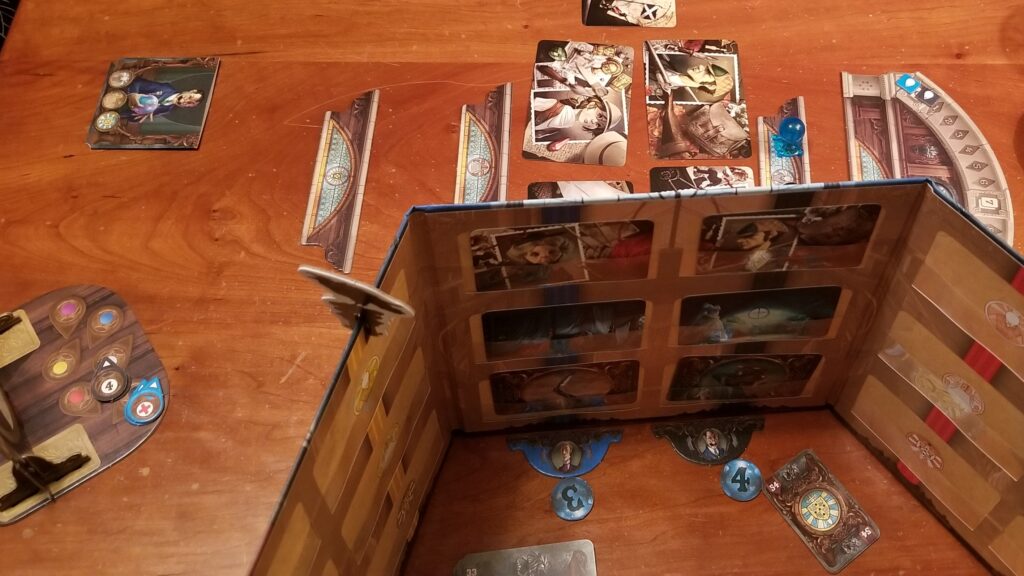
A murder was committed in a local manor and a group of psychics has opted to visit the residence on Halloween to make contact with the restless spirit of the deceased in order to divine who killed him where and with what weapon.
Let the seance begin…
So goes the (here less eloquent) setting opener for Mysterium, a tabletop game where one player is the dearly departed who is trying to guide the psychics to find the details of his murder.
Each individual psychic is seeking a unique combination of suspect, location and weapon that may be the collective answer to the murder mystery, with the right one revealed at the end of the game. Those unique three-card combinations have already been determined for each psychic and are hidden behind a blind that only the ghost can see, whereas the psychics have a pool for each of the potential killers, places and items–highly detailed paintings on cards–they must choose among.
The problem is that the ghost, perhaps still traumatized from the grisly event, is unable to speak, and has a hodgepodge of jumbled images going through his head that is all he can use to communicate to the psychics. Thus the psychics are only provided abstract images from the ghost–cards the ghost player hands over with dream-like imagery on them, from amusing to horrible, sometimes sensible but more often bizarre–that the players must use to figure out what the ghost is trying to direct each psychic toward for their own suspect, location and weapon.
But what the ghost is trying to point them toward could be through colours in the images, or shapes, or lighting, or abstract concepts. It isn’t often that the ghost player happens to be able to be clear about his intent through what he draws from the deck of shuffled images, leaving much to interpretation of the psychics.
Happily, while each player wants to figure out her unique three-aspect combination of suspect, location and weapon to get herself to the final round where the truth is revealed, all psychics are encouraged to collaborate on how to interpret what the ghost has shown each of them. This works well, because different people find different connections that the cards may be showing. Is the red in these cards trying to point to the red blanket on the bed? Is the knight’s sword in one card suggesting the razor was the weapon used in the murder, or is the hour glass the knight is in suggesting the clock was the weapon? There are repeating wheels and round shapes in these cards… could they be pointing to the round window in the attic?
In the last round of play, where one of the players has unknowingly solved the murder via correct guesses in the previous rounds, the psychics use some final cards from the ghost to cast a vote on who among them they believe has the right combination of murderer, location and weapon. Provided any of them are correct, they all win, because with the murder solved, the spirit can finally be put to rest. If none of them are right, they’ve lost and the game is over.
Mysterium is at once very well constructed and rewarding for all players who are able to correctly guess what the mute ghost is trying to tell them through abstract imagery, and at other times maddening for those same players when the images aren’t jibing well with what the ghost is trying to direct the psychics toward. The onus is largely on the ghost player, who is trying to help the psychic players make needed connections via that imagery, but there are times that it just doesn’t work well, where the ghost has to hope that the others can interpret the (sometimes thin at best) connections from the image cards drawn this round.
The friend who got the game for us and introduced us to it mentioned to me that in his experience, if you play Mysterium often enough with the same group of people, it can lose a bit of its mystery because, as with getting to know people well enough to know their tendencies and references, you develop a sort of shorthand in the game: Friends will start to recognize that when that friend-as-ghost hands you this card or that card, it’s an indicator of this or that particular aspect of the cards you’re choosing among.
I suspect it would take quite a bit of playing with the same players to get to that point (we’re nowhere near that ourselves), but if that may be of any concern to prospective players, Mysterium does have an expansion pack that would help offset that issue, as it includes more characters, locations, objects, and abstract cards for the ghost to communicate with.
Once you get a handle on the unique mechanics of getting the game set up and running, it’s a fun for the whole family, though to paraphrase what my nine-year-old pointed out tonight, it may be a bit dark for some kids. On the upside, though, now she knows what a straight razor is, so hey… yay homeschooling!